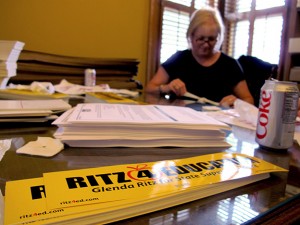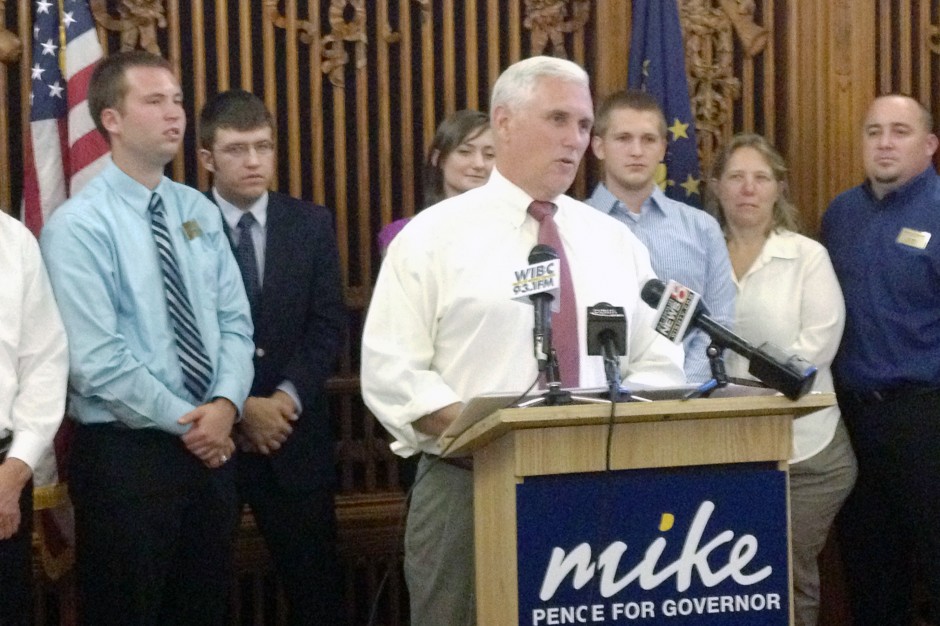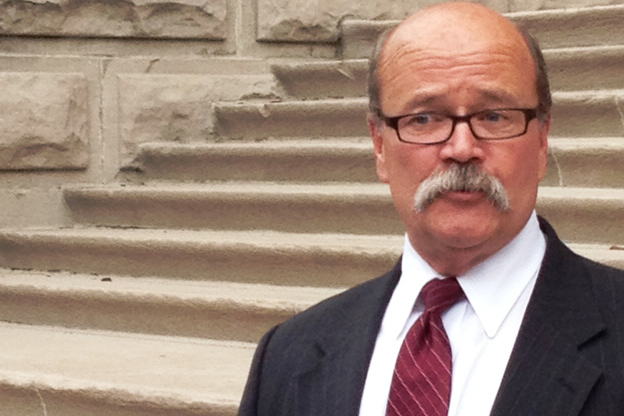Why This Year's Election Means A Little More For Indiana Teachers Unions

Kyle Stokes / StateImpact Indiana
Retired teacher Jill Lyday helps stuff bumper stickers and postcards into plastic bags for Democratic state superintendent candidate Glenda Ritz. Two large cash infusions and organizational support from the Indiana State Teachers Association have been key to Ritz's run for office.
The last time officials from the Indiana State Teachers Association gave as much money to a candidate for Superintendent of Public Instruction as they have this year, they gave it to a Republican.
In 2000, the political arm of the state’s largest teachers union — traditionally a contributor to Democratic campaigns — gave $100,000 to longtime GOP state superintendent Suellen Reed‘s re-election bid.
A lot has changed since 2000, when unions could negotiate teacher contracts with relatively few restrictions. A state law passed in 2011 now forbids them from collectively bargaining anything other than pay and benefits with districts.
Hamstrung in their ability to influence policy at a local bargaining table, unions are in dire need of more sympathy from the state’s highest political offices. So this year, teachers unions are doubling down on their political contributions to Democrats on the top of the November ballot.
- 'Less Power, But Still Powerful': Teachers Unions & The 2012 ElectionStateImpact Indiana‘s Elle Moxley examines how — and to what degree — the role of Indiana’s teachers unions has changed as the 2012 election approaches.Download
Teachers unions have long been political players and they’ve donated reliably and overwhelmingly to Democratic campaigns (with some exceptions). But this year, the ISTA is contributing to Democrats running for statewide office at an unprecedented level.
The Indiana State Teachers Association’s $250,000 in contributions to Democrat John Gregg is the largest amount the union has ever given to a candidate for governor.
—Mike McShane, American Enterprise Institute
Democratic state superintendent candidate Glenda Ritz owes nearly 90 percent of her campaign fundraising total to more than $100,000 in contributions from the ISTA and the Indiana Federation of Teachers. The unions are also organizing for Ritz at the school level, hoping to mobilize teachers to support Ritz’s campaign.
Bargaining Table vs. Ballot Box
The increase, in part, reflects the surge of cash into the state superintendent’s race. After the two state superintendent candidates in 2008 raised less than $400,000 between their campaigns, Tony Bennett has raised roughly $1 million in 2012 for his re-election run.
(Bennett, a Republican, has received contributions from givers as far-flung as the Walton family and New York City Mayor Michael Bloomberg.)
But part of the reason the ISTA has doubled the total it contributed in the 2008 gubernatorial and state superintendent races has to do with policy influence.

Kyle Stokes / StateImpact Indiana
Volunteers Jeannie McNew (left), Cindy Mahin and Jill Lyday (right) — all retired teachers — help stuff mailers for Democratic state superintendent candidate Glenda Ritz's campaign.
Before the 2011 collective bargaining law, unions and districts could negotiate teacher contracts effectively setting local policy in a wide range of areas, from class size to curriculum to the length of the school day. The new law limits unions from negotiating anything other than teacher pay and benefits.
“Because of what’s taken place, especially in the last two legislative sessions, I don’t think we’ve ever had to place as much importance on [political advocacy] as we find ourselves doing today,” Indiana Federation of Teachers president Rick Muir says.
Mike McShane, who researches education policy for the American Enterprise Institute, says restrictive collective bargaining laws have weakened teachers unions to a degree, but they remain a powerful political force.
“Whereas they might not be able to have the types of benefits or job protections codified into their contracts,” McShane says, “they might be able to sway elections that will put people in statehouses that will be more on their side in these types of debates.”
Unions Divide Dems
Limits to collective bargaining only explain part of the unions’ discomfort with the current direction of education policy. As ISTA president Nate Schnellenburger explained to StateImpact:
What we’ve seen happen here is, at lightning speed, they’re trying to push so-called reforms without taking the time to get it right. We certainly support education reform, we think everything should change and evolve and get better. But that process needs to be a thoughtful process. In terms of the [teacher] evaluation process, for example, now in Indiana, we feel they’ve tried to build the airplane while they’re flying it.
Outside the political arena, Indiana’s teachers unions have mounted legal challenges to the state’s new private school voucher program and recently won a court battle over a teacher contract form provided by the Indiana Department of Education.
But while the Democratic Party has been traditionally labor-friendly, some within the party have become more vocal in their criticism of the union’s stances on several big policy issues.
Larry Grau, who heads Indiana Democrats for Education Reform, told StateImpact he feels Indiana’s unions are dragging their feet on issues from teacher evaluations to statewide “accountability” systems for schools:
They need to go where their national leadership says they’re going: They need to be leading these reforms. But leading reforms, not going back to where we were before…
When the union is outright supporting candidates that are clearly a slap at us as reformers and doing a lot of messaging that’s anti-reform, that’s not constructive. That’s being completely resistant, and that’s not helpful.
Podcast: Play in new window | Download



